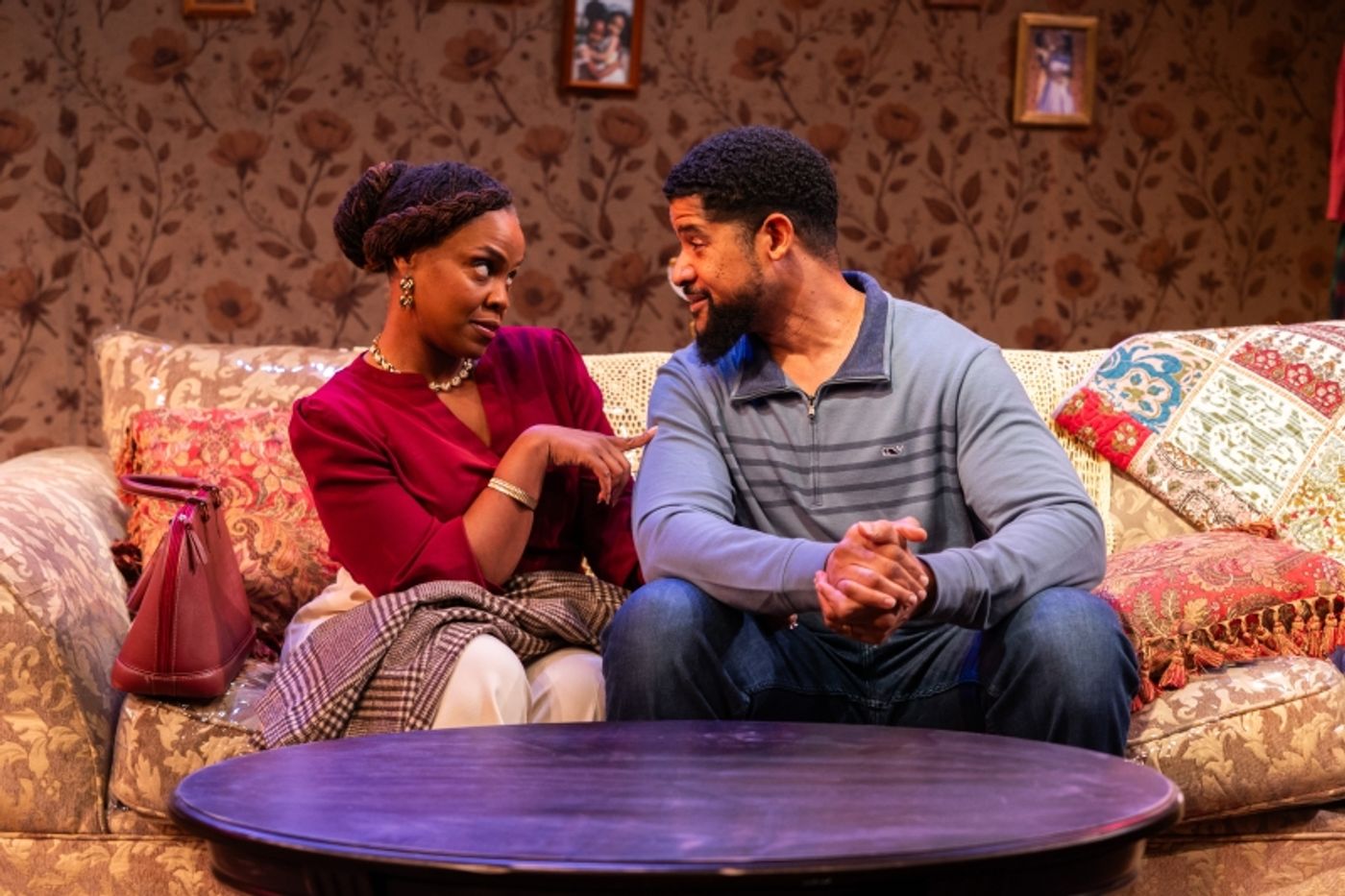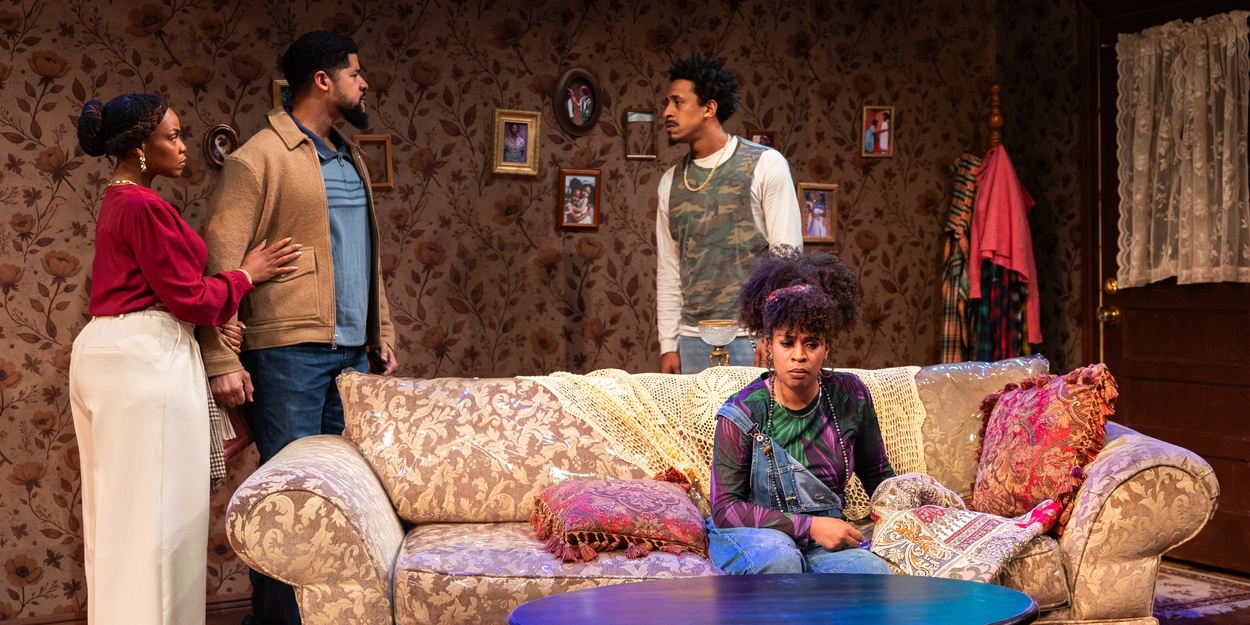Set in West Chester, a Pennsylvanian borough west of Philadelphia, MUD ROW follows two generations of sisters navigating political climates, marriages, and familial bonds. Directed brilliantly by Rachel Dickson, this production also marks the first time Dominique Morisseau’s play has been performed in Houston.
I always appreciate the extent that Stages goes to give audiences context that deepens the experience of the story they’re telling. As per usual, the lobby’s well-curated display informs us that while the play may take place in Pennsylvania, it could just as easily unfold here in Houston, or anywhere Black families sought to claim a place of their own, to raise children, put down roots, and build lives. The program further enhances the cultural backdrop with a timeline of the civil rights movement (locally, nationally, and in Philly), along with information about Project Row Houses in Houston’s Third Ward. That neighborhood mirrors the one in MUD ROW, where homes were passed down through generations, becoming living tapestries to perseverance, community, and shared memory.
The first generation of sisters we meet are Elsie and Frances (played by Kiya Green and Mariah Baillie, respectively), and they could not be more different. Older sister Frances is a budding activist at the opening of the show, and Elsie, we find out, is the grandmother of Regine and Toshi, guided by her hope for a better life. Both actresses are exceptional, pulling in the audience within seconds of their entrances. Baillie’s grounded temerity and conviction perfectly counter Green’s bright-eyed optimism, desperate to build something lasting for her child. The affection and tension between these two women form the emotional foundation of the play.
.jpg)
Regine (Lakeisha Rochelle Randle) and Davin (Roc Living) want nothing to do with the house they’ve “inherited.” They’re only there to assess, appraise, and sell. Having seen both of these actors in previous productions, I was eager to watch them work together, and they did not disappoint. Randle’s performance is deeply affecting, especially for anyone who’s ever been the older sibling shouldering responsibilities they never asked for. She has given all she can and has nothing left, even while still wanting to be the responsible sister. Her chemistry with Evans’ Toshi feels raw and lived-in. Living’s Davin, meanwhile, is both protector and peacemaker, a grounding force for Regine. His quiet empathy and subtle humor make him a joy to watch.
We soon learn that Toshi (Ashlyn Evans) and Tyriek (Brandon J. Morgan) have been squatting in the house for the past three months, trying to rebuild their lives with each other’s support. Of all the pairings, Evans and Morgan are the most entertaining, and no less endearing. The rapport they share feels electric and authentic. Evans’ Toshi is all heart and fire, determined to be taken seriously now that she’s found her footing. She’s instantly lovable and deeply relatable. Morgan’s Tyriek brings physicality and levity to every scene; the moment involving the crime scene tape is a standout, perfectly directed and executed.
The play’s structure of pairing scenes between sisters, couples, and generations,creates a rhythm that feels almost musical. The chemistry across the board is undeniable, from the love and friction between Frances and Elsie, to the tenderness and endurance between Regine and Davin, to the comic yet grounded animation of Toshi and Tyriek. When Regine and Toshi finally meet face-to-face, the tension that’s been building throughout the show reaches a satisfying, emotional peak, we are on the edges of our sets.

The Levit Stage has been transformed, and I loved how the audience shared such close proximity to the cozy, intimate living room of the row house. It’s a configuration I hadn’t seen before in this space, and it truly made us feel like we were sitting in the room with the characters. I do wish there had been a little more volume in terms of the actors’ voices. They were not miked, and I wish they had been, if even onstage or overhead. The audience on opening night was loud, in terms of rustling, whispering (not appropriate) and general stirring, and while the actors did a great job of projecting, the audience at times distracted and drowned out dialogue.
After the performance, we had the chance to meet and applaud the cast and crew, and chat with director Rachel Dickson. I was already impressed by what she accomplished onstage, but even more so by her genuine curiosity and openness in asking the audience for feedback. It was wonderful to tell her firsthand how much the story moved us.
.jpg)
“Knowing how we got somewhere, so we can get somewhere else,” Elsie says early in the play, and that, for me, sums up MUD ROW’s heartbeat. It’s a universal story rooted in history, identity, and the weight of legacy. Morisseau reminds us that our past is not something to escape, but something to understand, because in it lies the blueprint for who we become. This rich, powerful, and lyrical drama demands to be seen, felt, and discussed. It’s the kind of theatre that lingers with you long after the curtain call, reminding us that the stories of where we come from still shape where we’re going.
MUD ROW runs through Sunday, November 2nd on the Rochelle and Max Levit Stage. Showtimes are at 7:00pm Wednesdays through Sundays, with 2:00pm matinees on Saturdays and Sundays. The show is two acts and is about 2 hours and 15 minutes long with one intermission. More information on the theater and the production can be found here.
Reader Reviews


